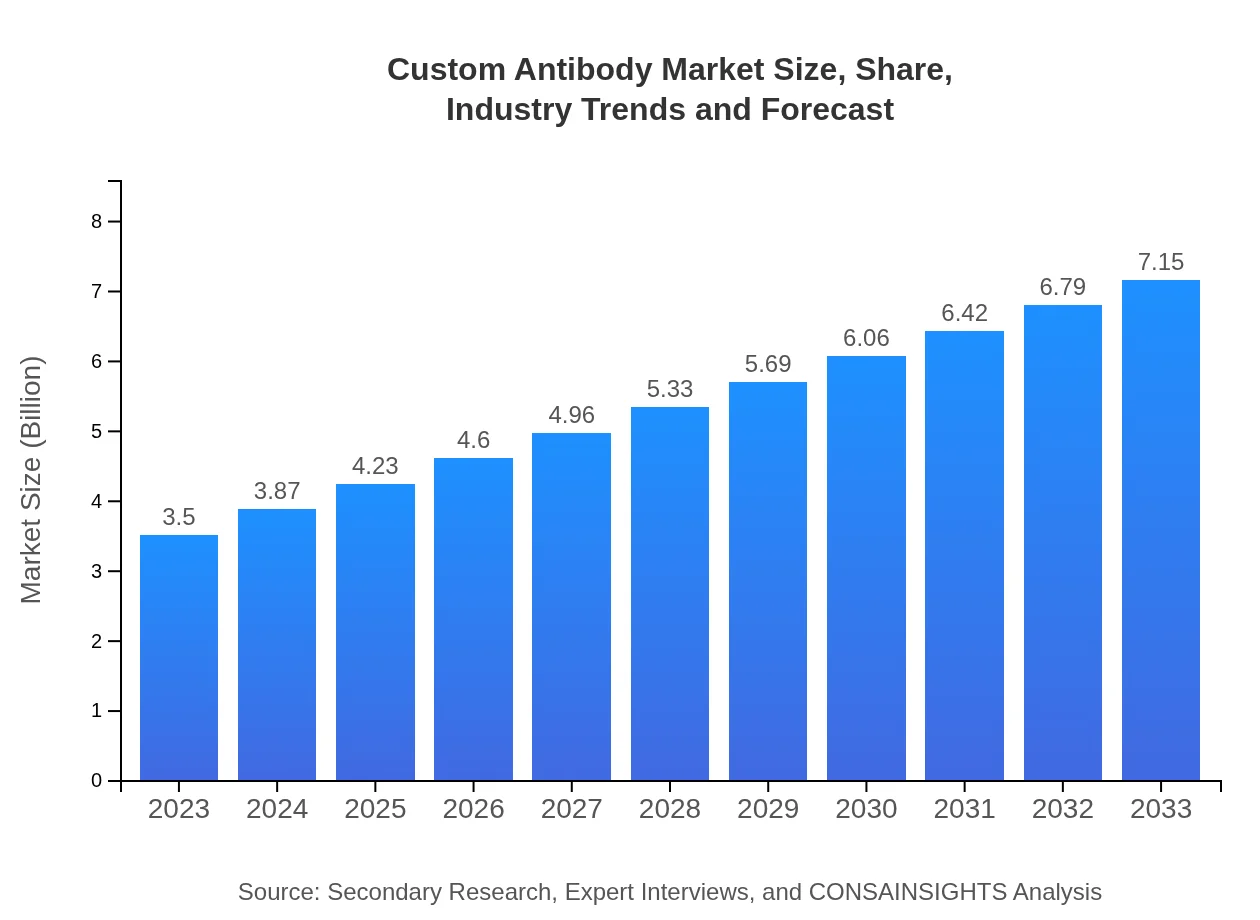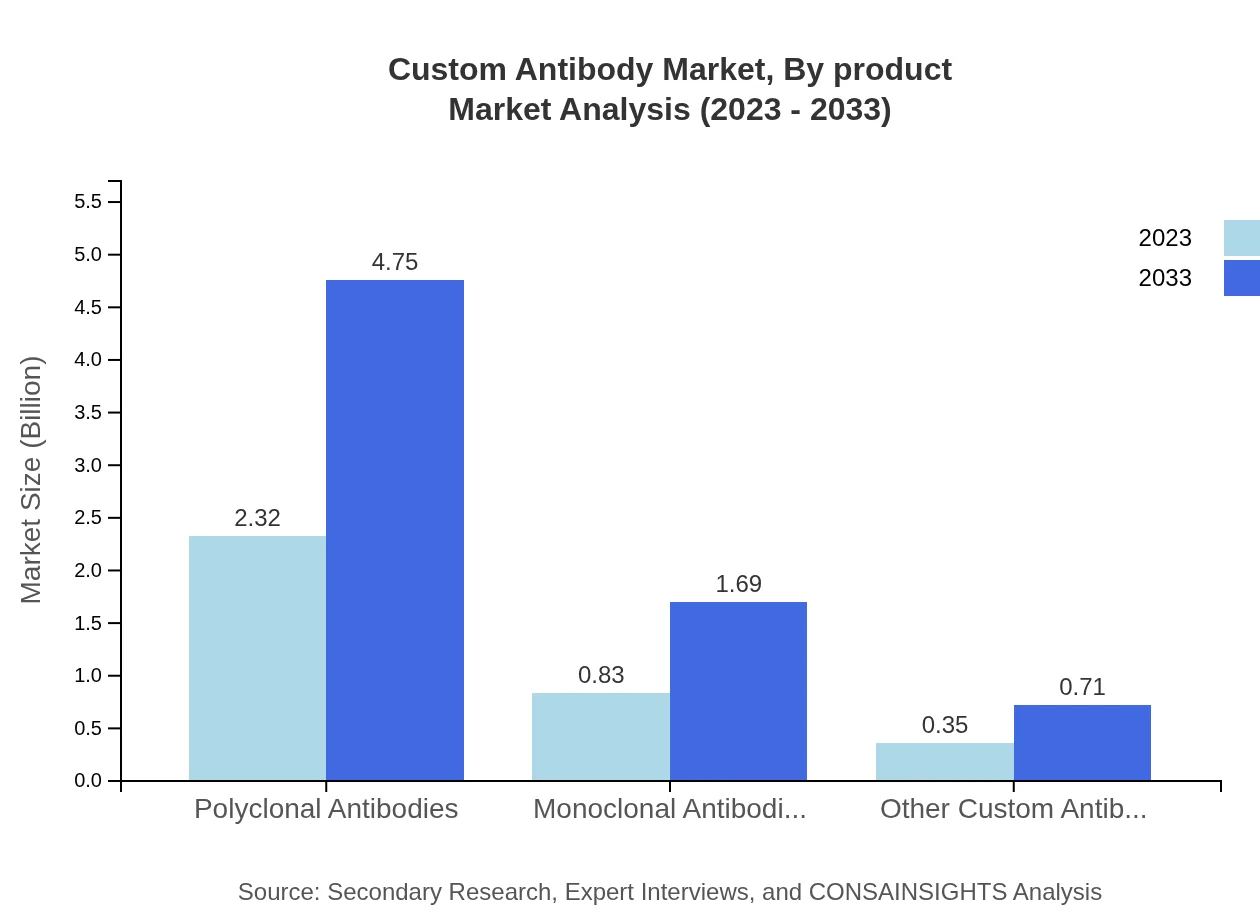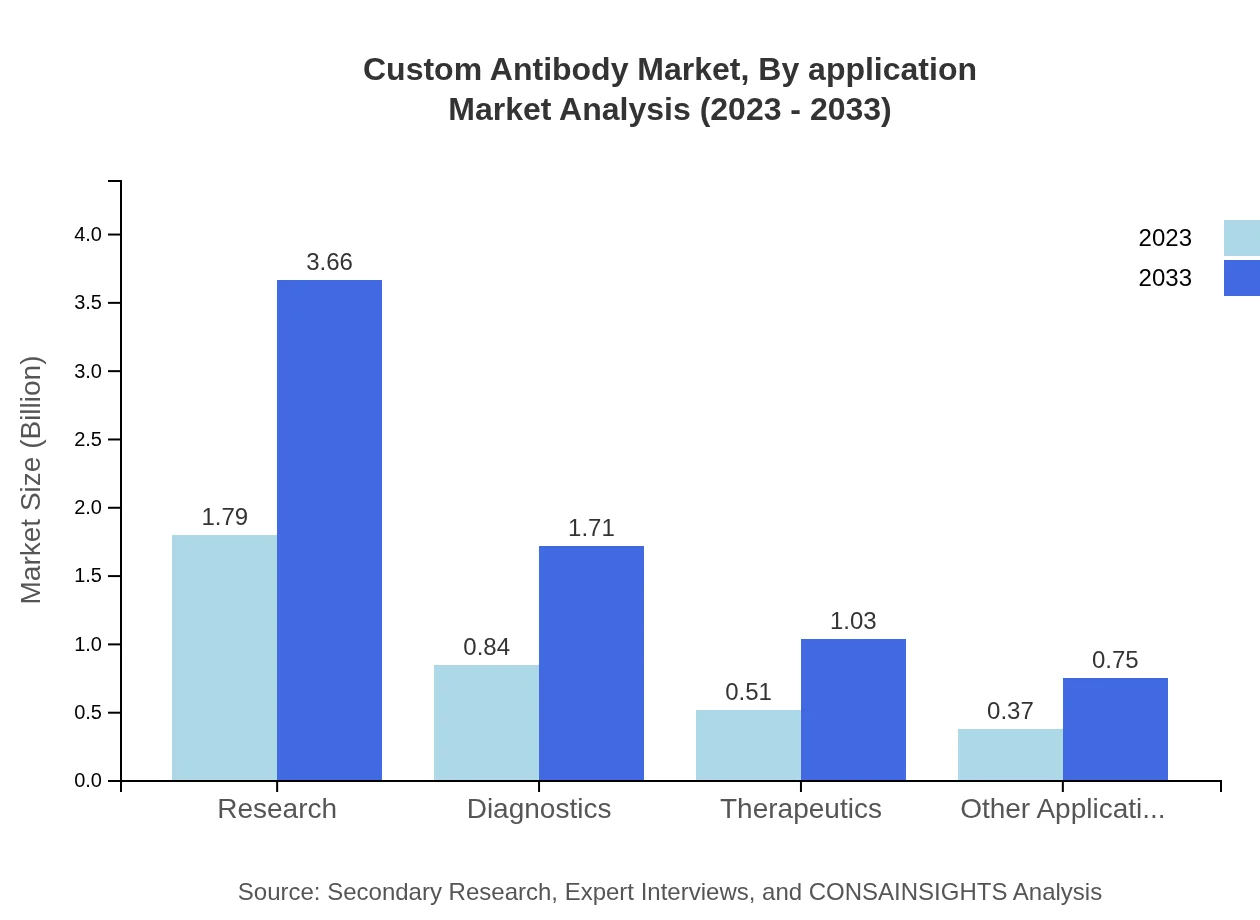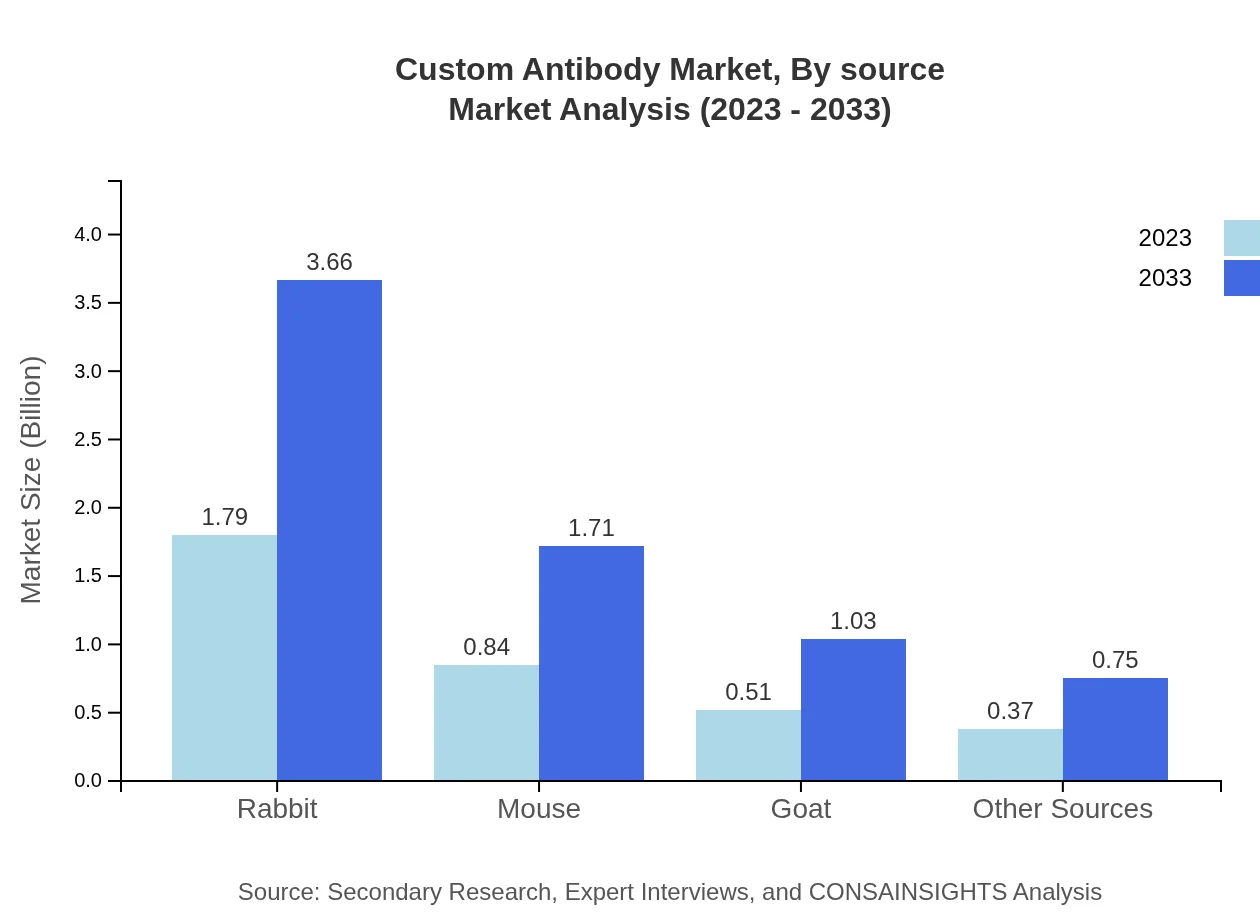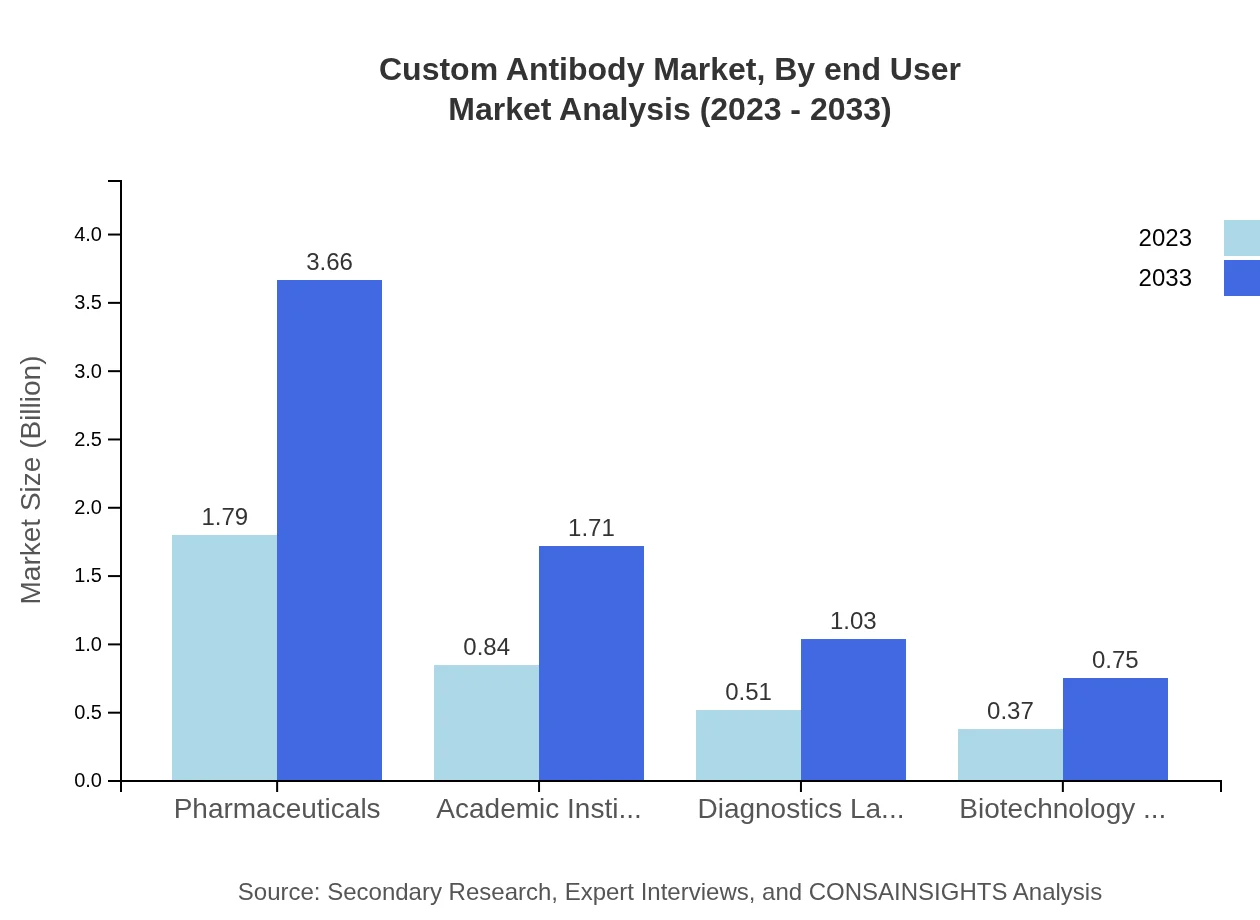Custom Antibody Market Report
Published Date: 31 January 2026 | Report Code: custom-antibody
Custom Antibody Market Size, Share, Industry Trends and Forecast to 2033
This market report details the Custom Antibody industry, offering insights into market trends, size, growth forecasts, and segment analyses from 2023 to 2033.
| Metric | Value |
|---|---|
| Study Period | 2023 - 2033 |
| 2023 Market Size | $3.50 Billion |
| CAGR (2023-2033) | 7.2% |
| 2033 Market Size | $7.15 Billion |
| Top Companies | Thermo Fisher Scientific, Abcam, GenScript, Rockland Immunochemicals, Merck KGaA |
| Last Modified Date | 31 January 2026 |
Custom Antibody Market Overview
Customize Custom Antibody Market Report market research report
- ✔ Get in-depth analysis of Custom Antibody market size, growth, and forecasts.
- ✔ Understand Custom Antibody's regional dynamics and industry-specific trends.
- ✔ Identify potential applications, end-user demand, and growth segments in Custom Antibody
What is the Market Size & CAGR of Custom Antibody market in 2023?
Custom Antibody Industry Analysis
Custom Antibody Market Segmentation and Scope
Tell us your focus area and get a customized research report.
Custom Antibody Market Analysis Report by Region
Europe Custom Antibody Market Report:
The European market for Custom Antibodies was valued at $1.09 billion in 2023, anticipated to grow to $2.23 billion by 2033. Adoption of advanced technologies in antibody generation and higher healthcare expenditures are key growth drivers. Strong emphasis on research for cancer treatment also plays a crucial role in market expansion throughout the region.Asia Pacific Custom Antibody Market Report:
The Custom Antibody market in the Asia Pacific region is gaining traction, with a market size of $0.65 billion in 2023, projected to reach $1.33 billion by 2033. Increased investment in biotechnology, coupled with a rise in research activities in India, China, and Japan, is driving this growth. The region is observing a shift towards personalized medicine and therapeutic antibodies, emphasizing development in this area.North America Custom Antibody Market Report:
North America holds a significant share of the Custom Antibody market, with a valuation of $1.24 billion in 2023 and expected to nearly double to $2.54 billion by 2033. The presence of numerous biotech firms, academic institutions, and high funding levels for research initiatives solidify this region's leadership in custom antibody development.South America Custom Antibody Market Report:
In South America, the market was valued at $0.19 billion in 2023 and is expected to grow to $0.38 billion by 2033. The expanding pharmaceuticals sector and increasing education initiatives regarding antibody use in research are contributing to this growth. However, economic and political challenges may limit market potential in some countries.Middle East & Africa Custom Antibody Market Report:
In the Middle East and Africa, the market is smaller, with a size of $0.33 billion in 2023, expected to rise to $0.67 billion by 2033. Growth is primarily fostered by government initiatives to boost biotechnology sectors and an increased focus on research capabilities for drug development.Tell us your focus area and get a customized research report.
Custom Antibody Market Analysis By Product
The Custom Antibody market segmentation by product is dominated by polyclonal antibodies, which held a market size of $2.32 billion in 2023 and is projected to grow to $4.75 billion by 2033, thanks to their versatility in research and diagnostics applications. Monoclonal antibodies followed, with a market size of $0.83 billion in 2023 to be $1.69 billion by 2033, fueled by their targeted therapeutic implications.
Custom Antibody Market Analysis By Application
Applications of Custom Antibodies are varied, with research accounting for approximately 51.18% of the market share in 2023, indicating a substantial reliance on these products for academic and clinical research. The diagnostics sector holds considerable relevance as diagnostic labs and academics increasingly utilize custom antibodies for assay development.
Custom Antibody Market Analysis By Source
In the segment of source animals, rabbits lead the market with a size of $1.79 billion in 2023 and a projected size of $3.66 billion by 2033. Their favorable immunological response contributes to their high utilization rate. Other sources such as mice and goats are also relevant, with mice holding 23.9% share and goats engaging at about 14.44%.
Custom Antibody Market Analysis By End User
The end-user segmentation highlights pharmaceuticals as a primary user of custom antibodies, generating revenues of $1.79 billion in 2023 and forecasted to reach $3.66 billion by 2033. Academic institutions and diagnostics labs contribute substantially, being critical for ongoing research and development across multiple therapeutic areas.
Custom Antibody Market Trends and Future Forecast
Tell us your focus area and get a customized research report.
Global Market Leaders and Top Companies in Custom Antibody Industry
Thermo Fisher Scientific:
A leading player in the biotech space, Thermo Fisher offers comprehensive solutions in custom antibody production, emphasizing quality and innovation in their service offerings.Abcam:
Abcam specializes in the production and sale of high-quality antibodies and actively diversifies its products in custom antibody development to cater to the growing research needs.GenScript:
GenScript is known for its cutting-edge technologies in antibody development, providing a variety of custom antibody services to the global research community.Rockland Immunochemicals:
Rockland offers custom antibody services with a focus on high specificity and sensitivity, catering to diverse applications in the life sciences.Merck KGaA:
Merck operates on a global scale, providing extensive solutions related to antibody production tailored for both research and therapeutic applications.We're grateful to work with incredible clients.









FAQs
What is the market size of custom Antibody?
The global custom antibody market is valued at $3.5 billion in 2023, with a projected CAGR of 7.2% through 2033, reflecting its significant growth potential within the biotechnology and pharmaceuticals sectors.
What are the key market players or companies in this custom Antibody industry?
Key players in the custom antibody market include Abcam, Thermo Fisher Scientific, GenScript, Fuda Biotech, and Merck KGaA, each contributing to advancements in custom antibody production and development across various applications.
What are the primary factors driving the growth in the custom Antibody industry?
The growth of the custom antibody market is driven by increasing demand from research institutions, advancements in antibody engineering, the surge in personalized medicine, and the expanding application of antibodies in diagnostics and therapeutics.
Which region is the fastest Growing in the custom Antibody?
North America is the fastest-growing region in the custom antibody market, with the market expected to increase from $1.24 billion in 2023 to $2.54 billion by 2033, followed closely by Europe and the Asia Pacific region.
Does ConsaInsights provide customized market report data for the custom Antibody industry?
Yes, ConsaInsights offers customized market report data tailored to client needs in the custom antibody industry, enabling detailed insights into market dynamics, trends, and forecasts.
What deliverables can I expect from this custom Antibody market research project?
From the custom antibody market research project, clients can expect comprehensive reports, market segmentation analysis, competitor analysis, data on industry trends, and forecasts that support strategic decision-making.
What are the market trends of custom Antibody?
Key market trends in the custom antibody sector include a rise in monoclonal and polyclonal antibodies demand, an increasing focus on therapeutic applications, and significant investments in biopharmaceutical R&D as companies seek innovative solutions.

